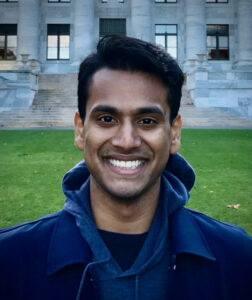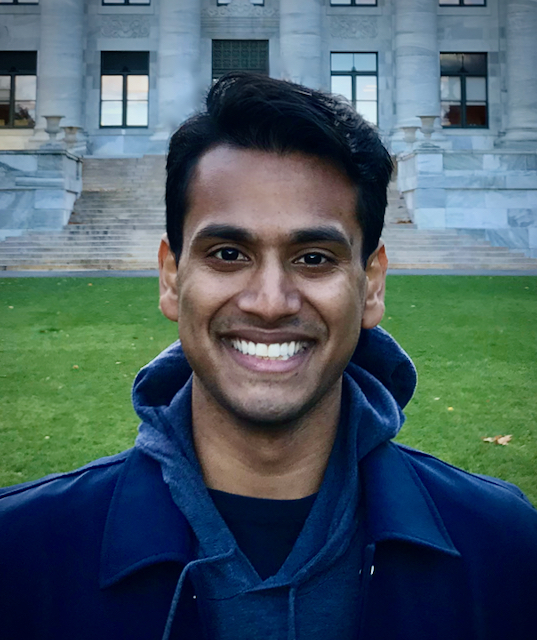We’re taking time to get to know the members of the GSA’s Early Career Scientist Committees. Join us to learn more about our early career scientist advocates.

Daniel Baker
Multimedia Committee
Perelman School of Medicine at the University of Pennsylvania
Research Interest:
Why do we get sicker as we grow older? Why is 20-year-old you so much healthier than 70-year-old you? These simple questions have captured the imagination of humans long before we looked into microscopes or began to manipulate DNA. Scientists are just beginning to understand why we grow old and developing ways to delay this process.
When you first think of aging, you might think of cosmetics like wrinkles or sagging skin, but did you know that a person’s age is the greatest risk factor for almost every disease. Whether it’s heart disease, cancer, obesity, strokes, or dementia they all are drastically increased during aging. Over the years there has been significant focus on a patient’s genetics, diet, or lifestyle. However, a therapy that targets the underlying cause of disease—aging—would drastically improve human health. Imagine what it would be like if we were able to delay the effects of aging. From removing the inconvenient aches and pains that accompany growing older, to remedying the tragedy of our loved ones forgetting us and themselves. I am fascinated by this simple but provocative question: why do we get old, and can we do something to slow this process down?
I first became interested in the science of aging during my undergraduate studies at Western Michigan University. There I saw how critical a patient’s age was to survival after undergoing a heart transplant. Seeing the effects of age in a clinical setting drove me to understand the biological basis of why aging makes us so vulnerable. While at Massachusetts General Hospital/Harvard Medical School, I developed an appreciation for the complexity of the genetic and epigenetic pathways that regulate the rate of aging. While it was clear that aging was complicated, these studies cemented in my mind that the biological processes underlying growing older were malleable and that scientists and clinicians could intervene to holistically improve health. As a result, I am pursuing my PhD at the University of Pennsylvania in the labs of Dr. Carl June and Dr. Zoltan Arany, where I am developing cell therapies that target aging and its associated diseases. There is a tremendous need for clinical tools that target the aging process. I hope to play a role in bringing these therapies into the clinic and changing the way we think about our health.
As a PhD-trained scientist, you have many career options. What interests you the most?
One of the reasons I chose to pursue my PhD is it allows me to have a foot in many worlds at the same time. I love the creativity that an academic position affords, and I would like to pursue a career in medicine focused on discovering novel therapies that impact the aging process. It is of vital importance to me that those discoveries impact patients and I would like to play a role in translating those therapies through biotechnology or industry partnerships. I also find it exciting to zoom out and look at the field from a wider perspective to see where the next breakthroughs will come from and I hope to do so by playing a role in both public funding and private venture to accelerate the next generation of ideas. Making sure everyone, especially the public, knows about the innovations that are occurring in science is vital and I aspire to be a voice for science outside of the academy. Regardless of where I find myself and what I am doing, I know I want to have an active role in teaching and mentoring the next generation of scientists.
In addition to your research, how do you want to advance the scientific enterprise?
Science struggles from a branding problem. Often, we think of scientists as dull, boring, monotone people, who are stuck alone in a lab all day looking at data. However, scientists are passionate, collaborative, and by the nature of their work—creative. The scientific enterprise requires hard work, determination, perseverance, and a whole host of other attributes. Contrary to its common portrayal, science is extremely exciting and engaging and could be greatly advanced if there was a better awareness of what scientists are really like. I think this perception is what prevents many people from aspiring to be scientists at an early age. Almost everyone I know in science came to it later in their life. I think getting younger minds excited about science and interested in becoming future scientists would help improve science itself with broad impacts on society at large.
As a leader within the Genetics Society of America, what do you hope to accomplish?
I joined the Genetics Society of America so that I could gain a broader perspective of the scientific community and contribute on a wider scale. I hope to learn a lot about areas of science I don’t spend a lot of time thinking about. I also hope to get people excited about science through our new podcast: Genetics in Your World. Ultimately, I hope that being a leader within the GSA will help me develop the skills I need to accomplish my goals while also helping to encourage a wide diversity of people.
Previous leadership experience:
- Developmental, Stem Cell, Regenerative Biology Peer Mentor at Perelman School of Medicine at the University of Pennsylvania
- Chair of Student Health Advisory Council at Sindecuse Health Center
- Diversity and Inclusion Committee at Sindecuse Health Center
- Chief Surgical Scribe at Family Surgical































